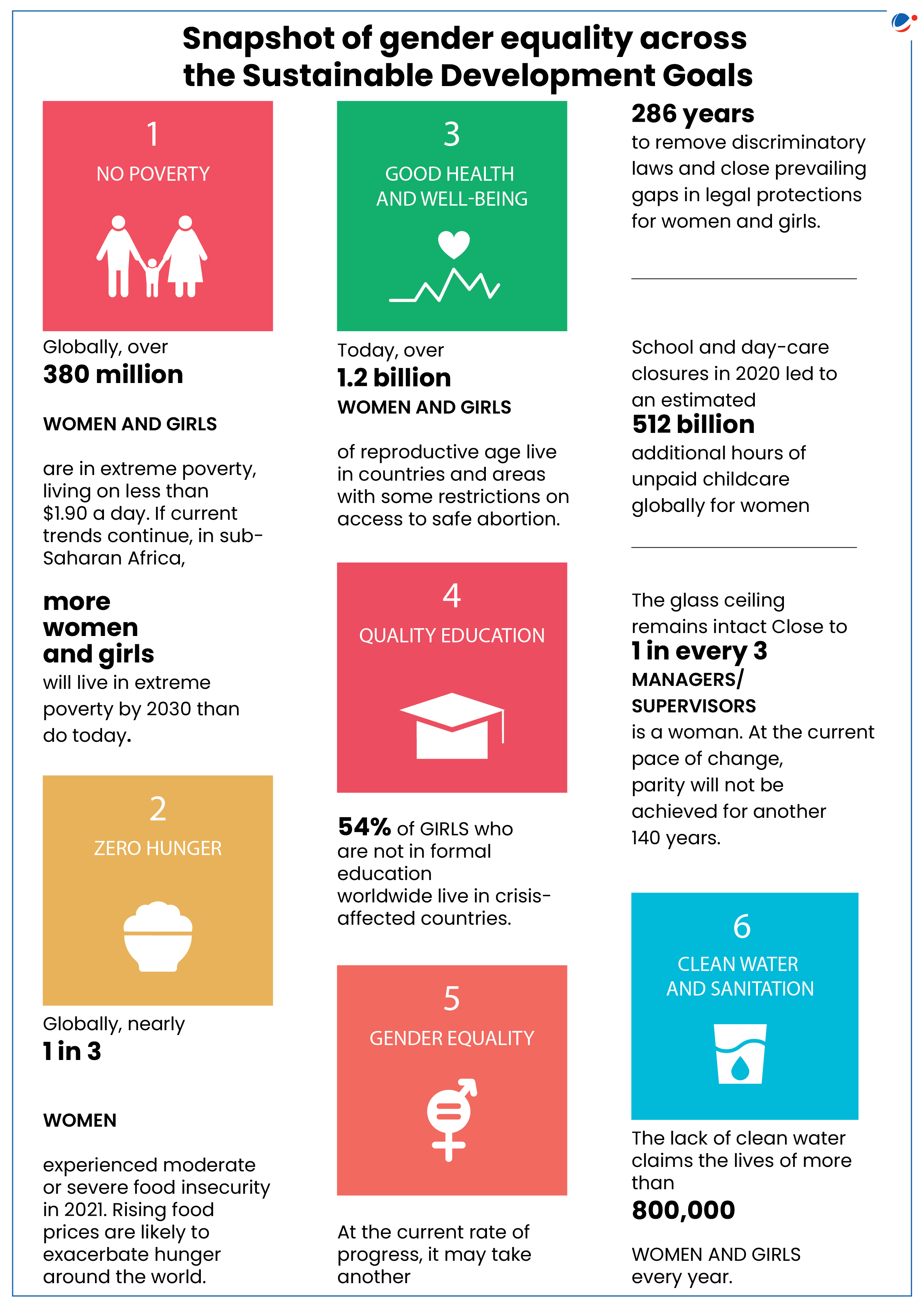Why in the News?
Recently, Elected Women Representatives (EWR) of Panchayati Raj Institutions (PRI) participated in an Event: "Localizing the SDGs: Women in Local Governance in India Lead the Way" in United Nations Headquarters.
About Localization of SDGs in India
- Localizing SDGs means enabling local governments and communities to be the catalysts of change to support the achievement of the global goals.
- Elected Women Representatives (EWRs) have been instrumental in driving positive change, emphasizing their significant contributions in achieving sustainable development at the grassroots level.
- Women leaders are a critical link between local governance, sustainable development, and gender equality.
- The 73rd Constitutional Amendment Act provides for reservation of 1/3 seats in the local bodies and has elevated women's participation in rural governance.
Status of EWRs
- According to Global Gender Gap report (2023), which added the inclusion of women in local governance as a new indicator:
- Globally, only 18 of the 146 countries surveyed have achieved representation of women of over 40 percent in local governance.
- India is among the countries with the highest participation of EWR in local governance (above 44%).
Impact created by EWRs in Localisation of SDGs in India
- Enhanced policy outcomes: For instance, EWR's from Rajasthan, with their initiatives have been promoting environmental sustainability, including the Swachh Bharat Abhiyan and efforts to curb plastic usage building a cleaner and greener future.
- Inclusive decision making: For instance, EWRs in Tripura constructed separate restrooms in government offices and assisted in growth of Self-Help Groups (SHGs) from 600 to almost 6,000.
- Address Gender Based Violence: For instance, A 2021 survey in Bihar found that EWRs play a key role in providing redressal support on issues of domestic violence and child marriage;
- 61 % of EWRs reported that they intervened to stop abuse reported by women in their constituencies, and
- 46% had intervened to stop child marriage.
- Challenging regressive norms: For instance, In Haryana, which is known for its low sex ratio, EWRs have made attempts to reduce the prevalence of the purdah system, encourage school education for girls, reduce open defecation.
Challenges faced by EWRs
- Balancing responsibilities: Prevailing gender norms make it difficult for EWRs to manage public duties and household responsibilities, which include a disproportionate share of domestic and care work.
- Lack of experience: Many EWRs, particularly those new to public life, face initial challenges such as lack of experience, leadership skills and confidence create hinderance in the decision making and governance.
- Gender based perception: Most women representatives report facing gender-based discrimination and feeling ignored in the panchayat owing to their gender as roles, like that of panchayat secretary and other posts, are dominated by men.
- Digital divide: The gender-related digital divide among EWRs hampers their capacity to fulfil their roles effectively in an era of increasing digitisation in governance and public service delivery
- Proxy Participation: A critical challenge to women's representation is the placement of 'rubber stamp candidates' in reserved seats, i.e female representatives reported proxy participation by their husbands (Panchayat Pati).
- Financial Constraints: Women representatives typically belong to lower economic groups compared to men, the financial constraints both as contestants and as representatives results in loss of autonomy and independence.
Way Forward
- Promoting awareness: Targeted training and public campaigns aimed at promoting positive masculinity can help create an environment that tackles gender biases within governance and households.
- Capacity building: Quality capacity-building programmes can substantially boost their skills and confidence, enabling them to function independently as leaders. To introduce leadership development programmes at district and panchayat levels.
- Institutional Reforms: Panchayats have a vital role in combating challenges posed by patriarchal society by promoting women's access to education, skilling, and safe work opportunities.
- State funding: Provisions for state funding or support from political parties will allow more women to contest panchayat elections. Greater financial remuneration for EWRs could also incentivise them to participate despite multiple societal hindrances.
- Other steps: Tailored solutions, such as customised digital literacy, inclusive design and accessibility and a safe digital environment, should be prioritised and strengthened.








